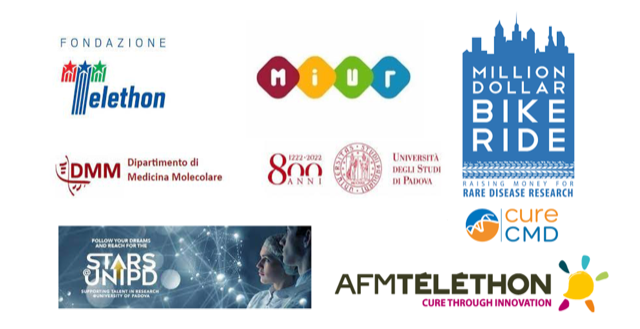Functional Genomics Research Unit
The Functional Genomics Research Unit is highly experienced in the generation and characterization of in vivo and in vitro models for dissecting the roles of key genes in both physiological and pathological conditions. Most of our studies focus on zebrafish and mouse models of human diseases, which we exploit for understanding the pathological mechanisms underlying diseases and for the design of novel therapeutic approaches.
Based on the long-lasting and highly advanced expertise of the unit on animal models for diseases, Prof. Paolo Bonaldo and Prof. Paola Braghetta founded some years ago MEMMIA, an university spin-off that provides a range of services for mouse genetic manipulation and cryopreservation of transgenic mouse lines.

Prof. Paolo Bonaldo (P.O., Coordinator)
Email: paolo.bonaldo@unipd.it
Twitter: @BonaldoLab
Publications: https://pubmed.ncbi.nlm.nih.gov/?term=paolo+bonaldo&sort=date
My team has a broad and long-standing expertise in mouse transgenesis and in the generation and characterization of mouse models for the study of the extracellular matrix. I am interested in the pathophysiological mechanisms underlying neuromuscular diseases, with a major focus on Collagen VI-related muscular dystrophies. In the last decades, I established several networks with geneticists and physicians studying these pathologies, and my team played a primary role in identifying novel therapeutic and druggable targets, ranging from dysfunctional organelles to autophagic impairment, as well as to molecular and functional defects of the neuromuscular junction. Besides a long-lasting expertise in the structural and functional characterization of extracellular matrix molecules, during the past two decades the team developed strong expertises in skeletal muscle, apoptosis and autophagy, as well as the interconnected signalling pathways, in both cells and in vivo tissues. More recently, we started investigating exosomes as useful circulating factors impacting on muscle homeostasis.
Current projects:
https://www.change-msca.eu/the-university-of-padova)
- Identification of Collagen VI receptors and their related signaling pathways;
- Therapeutic approaches to counteract the progression Collagen VI-related myopathies, including high-throughput drug screening in zebrafish null models and study of nutraceuticals the preclinical mouse models.
- 3D modelling of the muscle-tendon unit for unravelling the role of extracellular matrix in tissue crosstalk, with relevance for muscular dystrophies and aging.
Prof. Paola Braghetta (PA)
Email: paola.braghetta@unipd.it
Publications: https://pubmed.ncbi.nlm.nih.gov/?term=braghetta+p&sort=pubdate
My research interests are focused on the role of a distinctive family of extracellular matrix proteins, Emilins, able to modulate bioavailability of growth factors, in the cardiovascular and skeletal muscle systems and on the effects of their absence on cellular processes. Specifically, my most recent projects aim at investigating the roles of extracellular matrix and fibrosis in murine models of genetic cardiomyopathies. I am a partner of a project on cardiogenomics that has been funded by the European Innovation Council (IMPACT: Cardiogenomics meets Artificial Intelligence: a step forward in arrhythmogenic cardiomyopathy diagnosis and treatment), an innovative and multidisciplinary project, comprising academic institutions and leading companies in the fields of computer science, biotechnology, and pharmaceuticals. I have a broad and long-standing expertise in mouse transgenesis and in the generation and characterization of mouse models for diseases.
Current projects:
- Characterization of cardiac, skeletal muscle and neurological phenotype of mouse and zebrafish knockout models for different Emilins;
- Study of the role extracellular matrix deposition in cardiomyopathies and in human aortic aneurysms;
- hiPSCs mutagenesis and in vitro differentiation;
- Development of novel genetic tools for in vitro and in vivo transgenesis.
Prof. Matilde Cescon (PA)
Email: matilde.cescon@unipd.it
Publications: https://pubmed.ncbi.nlm.nih.gov/?term=cescon-matilde&sort=date
My main research interests focus on critical aspects impacting on the development and regeneration of the neuromuscular system. In particular, I’m currently studying the role of autophagy in myelinating glial cells, with relevance for their homeostasis and response to injury. With this aim, I developed transgenic mouse lines for the study of the contribution of defective autophagy in Schwann cells and oligodendrocytes to neuropathies and neurodegeneration. Moreover, I’m interested in the cross-talk between the peripheral nervous system and skeletal muscles, with a focus on how the neuromuscular junction is affected in pathological states.
Current projects:
- Investigating the role of autophagy-related proteins in central and peripheral myelination with ad hoc produced conditional knockout mice and in vitro models;
- Study of the impact of microbiota in neuromuscular development and nerve regeneration;
- Design of therapeutic approaches targeting the neuromuscular junction in Collagen VI-related myopathies.


Staff/People
- Dario Bizzotto, Research Assistant, mail: dario.bizzotto.1@unipd.it
- Nicola Facchinello, Postdoc, mail: nicola.facchinello@unipd.it
- Silvia Castagnaro, Postdoc, mail: silvia.castagnaro@unipd.it
- Lisa Gambarotto, PhD student (XXXIV cycle), mail: lisa.gambarotto@phd.unipd.it
- Samuele Metti, PhD student (XXXV cycle), mail: samuele.metti@phd.unipd.it
- Chiara Consorti, PhD student (XXXVI cycle), mail: chiara.consorti.1@studenti.unipd.it
- Loris Russo, PhD student (XXXVII cycle), mail: loris.russo@studenti.unipd.it
- Sonia Calabrò, PhD student (XXXVII cycle), mail: sonia.calabro@studenti.unipd.it





